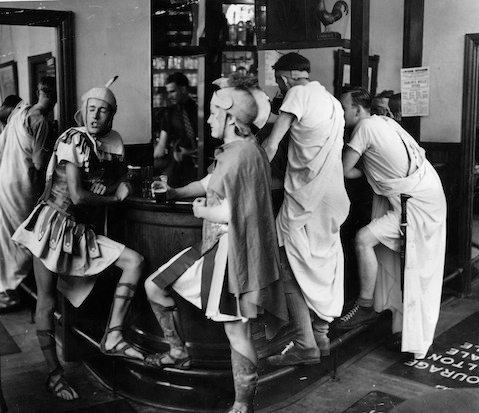At the beginning of The Art of Poetry, Horace tells a story that, he promises, will make anyone laugh: ‘If a painter wanted to put a horse’s head on a human neck, would you be able to keep your laughter in?’ Would you? I certainly would.
That’s the thing about Roman jokes: they’re not really very funny now. In 2008, when the comic Jim Bowen did an act based on the fourth-century AD Roman joke book, Philogelos (or The Laughter Lover), the jokes hadn’t improved with age: ‘A man complains that a slave he was sold had died. “When he was with me, he never did any such thing!” replies the seller.’ Did that really have them rolling in the aisles in the Colosseum?
So, if you’re expecting to laugh at the things that made Romans laugh, prepared to be disappointed by Mary Beard’s latest book. But, then, Beard isn’t trying to be funny — or even saying that the Romans were particularly funny, either. What she tries to do is nail what made the Romans laugh.
And what she pretty conclusively proves is that, even if we don’t find their jokes funny, the Romans gave us the furniture for our own comedy today. The language of modern humour is rooted in Latin. Iocus is Latin for ‘joke’; facetus, as in facetious, is Latin for ‘witty’; ridiculus, as in ridiculous, meant ‘laughable’.
Roman comic situations were similar to ours, too. Sex figures prominently. Cicero’s list of the different kinds of Roman jokes — based on ambiguity, the unexpected, wordplay, understatement, irony, ridicule, silliness and pratfalls — is pretty close to any comparable modern list.
And Beard shows how the basic skeleton of several Roman jokes still lives on in some modern jokes. The old story about Enoch Powell at the barber — ‘How should I cut your hair, sir?’ ‘In silence’ — appears in the Philogelos joke book.
Both Iris Murdoch, in The Sea, the Sea, and Sigmund Freud told versions of the story recounted by Valerius Maximus, the first century AD Roman writer: ‘A Roman governor of Sicily met an ordinary resident in the province who was his spitting image. The governor was amazed at the likeness, since his father had never been to the province. “But my father went to Rome,” the lookalike pointed out.’
The Romans even came up with the Englishman, Irishman and a Scotsman template, although their equivalents were the bald man, the barber and the clever man —with the clever man the butt of the gags in the Philogelos joke book.
For all the shared infrastructure of our jokes, though, there are some drastic differences. To begin with, Terence’s 161 BC play, The Eunuch, sounds like an episode of Up Pompeii! A lusty, lovesick youth, Charea, pretends to be a eunuch to get close to Pamphilia, an attractive slave-girl — nothing there to shock Frankie Howerd. But then, at the end of the play, Charea uses his eunuch disguise to rape Pamphilia, before marrying her — not so funny.
In one of the most radical differences between then and now, it appears that Romans laughed — and, like us, they transcribed laughter as ‘Ha-ha’ — but they didn’t smile. There are no Roman words for smiling — one of the reasons Beard sides with the theory of the French historian Jacques le Goff, who died in April, that smiling was an invention of the Middle Ages.
Beard herself quotes the old adage ‘Absence of evidence is not evidence of absence’ — and I find it hard to believe that smiling isn’t an integral human activity. Still, she is such an affable companion that it doesn’t matter much if you occasionally disagree with her— she is far too self-aware and untouchy to be convinced of her own righteousness.
This book is based on lectures Beard gave at the University of California, Berkeley, in 2008. So it’s not surprising that it’s fairly highbrow— not aimed at the general reader, like many of her previous books. Still, she never writes like other dry-as-dust, wilfully obscure dons, and her prose skips along even when she’s discussing Roman jokes that are toe-curlingly unfunny. Titter ye not — but expect to be engaged by an enthralling book.






Comments